Onhan se tehokas, mutta myös kehitys sykli nopea. Ei ole mitään järkeä pistää isoja rahoja kiinni nopeasti vanheneviin laitteisiin. Tärkeämpää on seurata teknistä kehitystä ja tuotanto tapoja, toki riittävällä volyymilla myös harjoittaa uuden aselajin koulutustaOn tuo drone äärimmäisen kustannustehokas laite. Mielestäni kaikkien poliittisten puolueiden puoluetuet pitäisi ottaa käyttöön mukisematta drone ostoihin ja drone pilotteja pitäisi kouluttaa suuria määriä, on ne jäätävän tehokkaita. Alkaa meinaan piilopaikat olla harvassa:
Install the app
How to install the app on iOS
Follow along with the video below to see how to install our site as a web app on your home screen.
Note: This feature may not be available in some browsers.
You are using an out of date browser. It may not display this or other websites correctly.
You should upgrade or use an alternative browser.
You should upgrade or use an alternative browser.
Ukrainan konflikti/sota
RKSTAK
Ylipäällikkö
Joo, viestisi on selvä: Ukraina ei osaa mitään muuta kuin ryssiä. Mikä on kartan mittakaava tuossa huimassa ryssien 2 kk etenemisessä? Mikä operatiivinen tai strateginen vaikutus sillä on ollut sotaan?
Onhan se ryssimistä kun ryssä etenee. Eikö saa kritisoida Ukrainan kykyä puolustaa, meneekö nojatuolikenraalilla tunteisiin?
Se nyt vaan on fakta että ryssä etenee.
Leaderdog
Kaukopartio
^^ En tiedä puoluetukien määristä €uroina ja mitä esim. panssarivaunu, ohjusjärjestelmä, tutkat yms. maksaa. Mutta jos kolmen tonnin dronella pystyy tuhomaan noita, niin on se kustannustehokas laite, ilman että itse pilotti on välittömässä vaarassa. Ajoneuvoissa koko miehistö on vaarassa, kun tellu katolle napsahtaa.
Leaderdog
Kaukopartio
Jos on aihetta kritisoida, niin on selvää että näin pitää tehdä. Eihän sitä muuten mitenkään opi / viisastu.Onhan se ryssimistä kun ryssä etenee. Eikö saa kritisoida Ukrainan kykyä puolustaa, meneekö nojatuolikenraalilla tunteisiin?
Se nyt vaan on fakta että ryssä etenee.
RKSTAK
Ylipäällikkö
Hanskille havainne kuvat. Ukraina käytti noiden vihreiden alueiden takaisin valtaukseen vuonna 2023 merkittävästi resursseja joista iloittiin täälläkin foorumilla, nyt ne on historiaa.
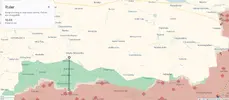
Tilanne 1.1.2024
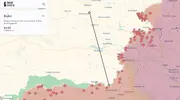
Tilanne 19.1.2025
Ukrainan joukot eivät näitä menetettyjä alueita takaisin ota ilman länsijoukkojen tukea, se on fakta. Ryssä pommittaa Pokrovskia ja yrittää selvästi sen saarrostusta, Ukrainalla kuitenkin puolustusasemat kaupungin ympärillä. Velyka Novosilka kaatunee ryssille lähipäivinä. Pokrovsk on kuitenkin ollut 60 000 asukkaan kaupunki jonka pohjoispuolella kulkee Ukrainan tärkeät huoltoreitit. Bakhmutin kohtalo edessä, sen kai jokainen aavistaa.
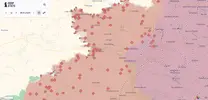

Tilanne 1.1.2024

Tilanne 19.1.2025
Ukrainan joukot eivät näitä menetettyjä alueita takaisin ota ilman länsijoukkojen tukea, se on fakta. Ryssä pommittaa Pokrovskia ja yrittää selvästi sen saarrostusta, Ukrainalla kuitenkin puolustusasemat kaupungin ympärillä. Velyka Novosilka kaatunee ryssille lähipäivinä. Pokrovsk on kuitenkin ollut 60 000 asukkaan kaupunki jonka pohjoispuolella kulkee Ukrainan tärkeät huoltoreitit. Bakhmutin kohtalo edessä, sen kai jokainen aavistaa.

Benelli
Respected Leader
Toisaalta Saksakin valloitti huomattavia alueita 1918 keväällä ja hävisi sodan vielä saman vuonna.Hanskille havainne kuvat. Ukraina käytti noiden vihreiden alueiden takaisin valtaukseen vuonna 2023 merkittävästi resursseja joista iloittiin täälläkin foorumilla, nyt ne on historiaa.
Katso liite: 116243
Tilanne 1.1.2024
Katso liite: 116244
Tilanne 19.1.2025
Ukrainan joukot eivät näitä menetettyjä alueita takaisin ota ilman länsijoukkojen tukea, se on fakta. Ryssä pommittaa Pokrovskia ja yrittää selvästi sen saarrostusta, Ukrainalla kuitenkin puolustusasemat kaupungin ympärillä. Velyka Novosilka kaatunee ryssille lähipäivinä. Pokrovsk on kuitenkin ollut 60 000 asukkaan kaupunki jonka pohjoispuolella kulkee Ukrainan tärkeät huoltoreitit. Bakhmutin kohtalo edessä, sen kai jokainen aavistaa.
Katso liite: 116245
Jos länsimaat jatkavat tukeaan vähintään nykyisellä tasolla, pakotteita ei höllenetä ja Venäjän talousvaikeudet alkavat kunnolla realisoitua niin Ukraina voi saada aloitteen sodassa.
Olettaen että Kiina ei huomattavasti kasvata tukeaan Venäjälle.
Sinänsä joku humanitaarinen miinanraivaus operaatio ja pari kenttäsairaalaa ei olisi kummoinen eskalaatio tässä vaiheessa.
-TripleX-
Respected Leader
TOR IT-järjestelmän kolkkaus halvalla droonilla, liekö se joka eilen mainittiin.
Ukrainan 47. ja 82. prikaatit niputtavat ryssiä huolella, menee miestä ja kalustoa melkoisesti.
Kun Ukraina ei ole huolissaan neliökilometreistä siellä tai täällä vaan ihmisistä, sotilaista siellä linjassa, niin miksi meidän tulisi olla erityisesti huolissaan niistä neliökilometreistä. Se on heidän maataan ja siellä ei ole isoimpana asiana mielessä tuo vaan miten säilytetään parhaiten kansakunnan resilienssi ja kyky jatkaa puolustustaistelua niin kauan kuin se sitä tarvitsee. Sodankäynnin tavoitteet ovat erilaiset, Ukraina tähtää siihen, että ryssien kyky sotia vähenee ja lopulta laskee sille tasolle, että se joko itse näkee hävinneensä tai alkaa hävitä kun ei kykene enää täydentämään, sen jälkeen tapahtuu Saksa 1945 tai tutummin Afganistan 1989. Askel askeleelta sitä kohti mennään. Venäjän tavoite on yrittää väkisin puskea eteenpäin ja saada alueita toivoen, että ne sille jäisivät jollain mekanismilla, jota eivät itsekään vielä tiedä miten se tapahtuisi.
Ukrainan 47. ja 82. prikaatit niputtavat ryssiä huolella, menee miestä ja kalustoa melkoisesti.
Kun Ukraina ei ole huolissaan neliökilometreistä siellä tai täällä vaan ihmisistä, sotilaista siellä linjassa, niin miksi meidän tulisi olla erityisesti huolissaan niistä neliökilometreistä. Se on heidän maataan ja siellä ei ole isoimpana asiana mielessä tuo vaan miten säilytetään parhaiten kansakunnan resilienssi ja kyky jatkaa puolustustaistelua niin kauan kuin se sitä tarvitsee. Sodankäynnin tavoitteet ovat erilaiset, Ukraina tähtää siihen, että ryssien kyky sotia vähenee ja lopulta laskee sille tasolle, että se joko itse näkee hävinneensä tai alkaa hävitä kun ei kykene enää täydentämään, sen jälkeen tapahtuu Saksa 1945 tai tutummin Afganistan 1989. Askel askeleelta sitä kohti mennään. Venäjän tavoite on yrittää väkisin puskea eteenpäin ja saada alueita toivoen, että ne sille jäisivät jollain mekanismilla, jota eivät itsekään vielä tiedä miten se tapahtuisi.
Tiedustelija
Kapteeni
Onhan se tehokas, mutta myös kehitys sykli nopea. Ei ole mitään järkeä pistää isoja rahoja kiinni nopeasti vanheneviin laitteisiin. Tärkeämpää on seurata teknistä kehitystä ja tuotanto tapoja, toki riittävällä volyymilla myös harjoittaa uuden aselajin koulutusta
Ainakin täällä ollaan sitä mieltä että ryssällä ei ole mitään kykyä tuottaa kehittynyttä teknologiaa niin mikä olisi se keino millä ryssä tekee Ukrainan dronet hyödyttömäksi?
Itse näkisin että nyt pitäisi laittaa isosti rahaa ja paukkuja sellaisten droonien kehittämiseen mitkä tekevät perus rynkkymiesten työn mutta tehokkaasti ja turvallisesti. Ryssä etenee jalkaväellä niin pitäisi pystyä saamaan tehokkaasti ryssää kumoon ja lähes nolla tappioilla. Tykistö on liian epätarkkaa ja kallista. Eikä toimi lyhyiltä etäisyyksiltä. Droneoperaattoreita on helppo kouluttaa ja monelle nykynuorelle peliohjain on tuttu ennestään. Pitäis saada sellainen oikeasti toimiva lentävä rynkky ja mielellään sellainen että toimii pimeässä. Jos näissä olisi samaa teknologiaa kuin siinä tähtäimessä joka laittaa rynkyn ampumaan itsestään kun tähtäys ja ennakot on kohdillaan niin näillä voisi poimia kokonaisen ryhmän vihuja vauhdista ja palata takas hakeen täydennyksiä. Se on vaan ajan kysymys milloin tällaisia tulee.
Totta, käytti paljon resursseja ja käyttää yhäkin. Sitähän sota on. Vaikka rintama liikkuisi resurssien käytöstä huolimatta huonoon suuntaan, ei välttämättä tarkoita, että olisi tehty virhettä. Toinen osapuoli oli vain vahvempi. Tietysti virhekin voi olla syynä, mutta yksittäistapauksia on mahdoton arvioida, kun ei tiedä laajempia strategisia tavoitteita.Hanskille havainne kuvat. Ukraina käytti noiden vihreiden alueiden takaisin valtaukseen vuonna 2023 merkittävästi resursseja joista iloittiin täälläkin foorumilla, nyt ne on historiaa.
Katso liite: 116243
Tilanne 1.1.2024
Katso liite: 116244
Tilanne 19.1.2025
Ukrainan joukot eivät näitä menetettyjä alueita takaisin ota ilman länsijoukkojen tukea, se on fakta. Ryssä pommittaa Pokrovskia ja yrittää selvästi sen saarrostusta, Ukrainalla kuitenkin puolustusasemat kaupungin ympärillä. Velyka Novosilka kaatunee ryssille lähipäivinä. Pokrovsk on kuitenkin ollut 60 000 asukkaan kaupunki jonka pohjoispuolella kulkee Ukrainan tärkeät huoltoreitit. Bakhmutin kohtalo edessä, sen kai jokainen aavistaa.
Katso liite: 116245
-TripleX-
Respected Leader
Ainakin täällä ollaan sitä mieltä että ryssällä ei ole mitään kykyä tuottaa kehittynyttä teknologiaa niin mikä olisi se keino millä ryssä tekee Ukrainan dronet hyödyttömäksi?
Itse näkisin että nyt pitäisi laittaa isosti rahaa ja paukkuja sellaisten droonien kehittämiseen mitkä tekevät perus rynkkymiesten työn mutta tehokkaasti ja turvallisesti. Ryssä etenee jalkaväellä niin pitäisi pystyä saamaan tehokkaasti ryssää kumoon ja lähes nolla tappioilla. Tykistö on liian epätarkkaa ja kallista. Eikä toimi lyhyiltä etäisyyksiltä. Droneoperaattoreita on helppo kouluttaa ja monelle nykynuorelle peliohjain on tuttu ennestään. Pitäis saada sellainen oikeasti toimiva lentävä rynkky ja mielellään sellainen että toimii pimeässä. Jos näissä olisi samaa teknologiaa kuin siinä tähtäimessä joka laittaa rynkyn ampumaan itsestään kun tähtäys ja ennakot on kohdillaan niin näillä voisi poimia kokonaisen ryhmän vihuja vauhdista ja palata takas hakeen täydennyksiä. Se on vaan ajan kysymys milloin tällaisia tulee.
Älä höpötä.
Ukrainalla on neljä miljoonaa droonia vuodessa käytössä, enemmän kuin kenelläkään koskaan ja sekin vaatii noin 20-25 maan ponnistelut.
Silti se ei ole kuin 10 droonia per joukkue kuukaudessa tasan jaettuna. Ne lentää yksi mies ja tarvitaan joukkueeseen edelleen 24 "rynnäkkökiväärimiestä".
"Peliohjainmiehet" ovat edelleen todellinen vähemmistö. Ukrainan ~900000 miehen armeijassa niitä on ehkä 10000-15000 jotka oikeasti lentää paljon drooneja kohteisiin.
Antares
Respected Leader
Kumpi tulee ensin, miljoona kuollutta/haavoittunutta vaiko "voiton päivä"?
JOS tämänhetkinen meno jatkuu samanlaisena voitonpäivään asti eikä nähdä ainakaan merkittävää tappioiden laskua, niin tulee olemaan hyvin lähellä tuo miljoonan tappiot voitonpäivänä eli 9.5.2025.
Edellinen 100 000 kertyminen (tarkalleen ottaen 100 920) vei 65 päivää, ryssän tappiot kasvoivat 699 090 --> 800 010 aikavälillä 3.11.2024 - 7.1.2025.
Nyt eletään 20.1.2025 ja tämän päivän numero on 820 430 joten miljoonaan on matkaa 179 570.
Voitonpäivään on matkaa 109 päivää.
Voidaan siis kokeilla:
109 / 65 x 100 920 = 169 235
Näin nähtynä ei ihan ehdittäisi saavuttaa miljoonaa voitonpäivään mennessä mutta ei olla kaukana siitä (989 665).
Toisaalta jos tarkastellaan ryssän "henkilöstön" raakadataa, niin viime kuukausina "päivän numero" on heilunut rajusti päivästä toiseen. Trendi on nähtävissä eli käyrä osoittaa ylöspäin, mutta vaihtelu on ollut suurta. Se ei lupaa hyvää ennustettavuuden näkökulmasta.
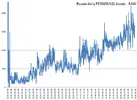
Puurokulho
Kapteeni
Huhujen mukaan uket olis laittamassa Liskin varikolla taas grillibileitä pystyyn, vastahan ryssät sai ton sammutettua. Paikallisten mukaan alueelta kuultu kahdesta neljään räjähdystä, videokin droonin osumasta kiertää. Tosin huomiona sanoisin että odotellaan vahvistuksia, ei olis eka kerta ku vanhat videot kiertää.
Tiedustelija
Kapteeni
Älä höpötä.
Ukrainalla on neljä miljoonaa droonia vuodessa käytössä, enemmän kuin kenelläkään koskaan ja sekin vaatii noin 20-25 maan ponnistelut.
Silti se ei ole kuin 10 droonia per joukkue kuukaudessa tasan jaettuna. Ne lentää yksi mies ja tarvitaan joukkueeseen edelleen 24 "rynnäkkökiväärimiestä".
"Peliohjainmiehet" ovat edelleen todellinen vähemmistö. Ukrainan ~900000 miehen armeijassa niitä on ehkä 10000-15000 jotka oikeasti lentää paljon drooneja kohteisiin.
No tuohon suuntaan kannattaa pyrkiä varsinkin Suomen kaltaisilla mailla joilla miehet loppuu ennen kuin sota edes pääsee alkamaan kunnolla. Minusta tuo on tuhlausta taistella mies vs mies rynkyillä vaikka olisi täysin mahdollista kehittää jotain toimivaa. Eikös Ruotsilla jotain ollut suunnitteilla? Nuo fpv droonit on ihan hyviä kalustoa vastaan. Ei vaan vielä ole näkynyt oikeasti toimivaa millä saisi kerralla kaikki näköpiirissä olevat ukot tapettua. Sellainen kuitenkin olisi mahdollista toteuttaa. En tiedä mitä maksaa, mutta eihän näitä samassa mittakaavassa tarvi tehdä kuin tykin mukuloita. Tai sitten jotain mini droonia jotka hakeutuu itsestään vihuun. Pointti oli se että jotain pitäisi keksiä millä säästetään henkiä.
Ennen Ukrainan sotaa ei kukaan kuvitellut että droonit olisi se millä suht lähietäisyydeltä tuhotaan panssarit. Ne piti olla olalta ammuttavien aluetta. Nyt säästetään valtavasti henkiä kun ei tarvi itse olla tulietäisyydellä. Seuraava loikka on tehdä sama jalkaväkeä vastaan. En tietenkään tarkoita että joka ukolle kapula kouraan, mutta jos jossain lohkolla ryssä puskee ihnisaaltoa niin sellaisiin paikkoihin.
Antares
Respected Leader
Mielenkiintoista, satelliittikuvien perusteella tätä varastoa on tuhottu muutama rakennus kerrallaan:
During a Ukrainian attack on the Bryansk region on January 13, the 120th GRAU arsenal was reportedly hit again alongside the Powder Plant.
One hangar was destroyed.
Previously, the arsenal was attacked on November 10, detonating two hangars.
During a Ukrainian attack on the Bryansk region on January 13, the 120th GRAU arsenal was reportedly hit again alongside the Powder Plant.
One hangar was destroyed.
Previously, the arsenal was attacked on November 10, detonating two hangars.
putkirassi
Majuri
Muistetaan yksi fakta: Dronin valmistaminen vs. Sotilaan valmistaminen ( koulutus) puhumattakaa Alusta saakka " valmistuksesta". On todella nopeaa. Valmistakaamme siis droneja ja pitäkäämme operaattorit suojassa ja lämpimässä.No tuohon suuntaan kannattaa pyrkiä varsinkin Suomen kaltaisilla mailla joilla miehet loppuu ennen kuin sota edes pääsee alkamaan kunnolla. Minusta tuo on tuhlausta taistella mies vs mies rynkyillä vaikka olisi täysin mahdollista kehittää jotain toimivaa. Eikös Ruotsilla jotain ollut suunnitteilla? Nuo fpv droonit on ihan hyviä kalustoa vastaan. Ei vaan vielä ole näkynyt oikeasti toimivaa millä saisi kerralla kaikki näköpiirissä olevat ukot tapettua. Sellainen kuitenkin olisi mahdollista toteuttaa. En tiedä mitä maksaa, mutta eihän näitä samassa mittakaavassa tarvi tehdä kuin tykin mukuloita. Tai sitten jotain mini droonia jotka hakeutuu itsestään vihuun. Pointti oli se että jotain pitäisi keksiä millä säästetään henkiä.
Ennen Ukrainan sotaa ei kukaan kuvitellut että droonit olisi se millä suht lähietäisyydeltä tuhotaan panssarit. Ne piti olla olalta ammuttavien aluetta. Nyt säästetään valtavasti henkiä kun ei tarvi itse olla tulietäisyydellä. Seuraava loikka on tehdä sama jalkaväkeä vastaan. En tietenkään tarkoita että joka ukolle kapula kouraan, mutta jos jossain lohkolla ryssä puskee ihnisaaltoa niin sellaisiin paikkoihin.
Antares
Respected Leader
Liskissä sijaitseva polttoainevarasto saattanut olla yksi kohteista (jälleen), ainakin jotain siellä palaa:
Very preliminary reports that the oil depot in Liski, Voronezh region, was again attacked by Ukrainian UAVs.
It was already burning for 4-5 days.
-
A bright fire in Liski, Voronezh region.
Very preliminary reports that the oil depot in Liski, Voronezh region, was again attacked by Ukrainian UAVs.
It was already burning for 4-5 days.
-
A bright fire in Liski, Voronezh region.
Nyt kuulkaas Venäjällä näkyy säröjä.
1. Nashi-nuorten perustaja puhelee julkisesti vähättelevästi Putinista ja se on merkki siitä, että Putiniin kyynisesti suhtautuvien eliitin jäsenten määrä on nousussa. Käännekohtana on erityisesti Prigozhinin kapina.

 www.uusisuomi.fi
www.uusisuomi.fi
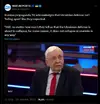
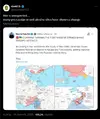
1. Nashi-nuorten perustaja puhelee julkisesti vähättelevästi Putinista ja se on merkki siitä, että Putiniin kyynisesti suhtautuvien eliitin jäsenten määrä on nousussa. Käännekohtana on erityisesti Prigozhinin kapina.
Raju lausunto Vladimir Putinista ravisuttaa Venäjällä
Putinin tueksi luodun Nashi-nuorisojärjestön perustaja on palannut pitkän hiljaiselon jälkeen julkisuuteen. Tutkija uskoo, että Venäjän eliitissä on tekeillä muutos.
2. Venäjän propaganda myöntää, että Ukrainan iskuilla Venäjän energiainfraan on isoja vaikutuksia Venäjän talouteen. Lisäksi myönnetään, että ei se pentele Ukrainan puolustus romahda, vaikka miten hyö studiossa asiasta huutavat ja Metukka kännipäissään ydinaseilla uhkailee.Vasily Yakemenko, a former prominent figure in the Russian political elite, made waves in a recent interview with a series of provocative statements, one of which included referring to Vladimir Putin as “Volodka”—a diminutive and informal version of his name. This particular remark reminded me of an incident a decade ago involving Rosneft's Igor Sechin, Putin's proxy. At the launch of the West Alpha platform in the Kara Sea, while waiting for a live feed with Putin, Sechin nervously removed his winter jacket, visibly agitated. At the time, many mocked Sechin’s apparent fear of Putin.
However, this moment underscores a deeper divide within Putin’s elite. Figures like Sechin, unlike Yakemenko, treated Putin with near-reverence. This distinction reflects two types of elites within Putin’s system: those who viewed Putin cynically, as a small-time schemer like themselves, and those who saw him as the embodiment of the Leviathan—the State itself. By the later stages of Putinism, particularly as the war in Ukraine began, the first group had nearly vanished, replaced by those acting with deference and fear. Yet some of the cynical elites remain, though they must now feign loyalty to the Leviathan.
Interestingly, Putin himself often adopts an overly familiar demeanor and tolerates—or even invites—a certain pejorative attitude. This is an open secret within Russian politics.
What’s the point? Recently, and this is my subjective observation, the Yakemenko “Volodka” perception of Putin has started to re-emerge. The awe surrounding Putin has been fading for the past two years, particularly after the Prigozhin rebellion. The full consequences of that event have yet to be realized, but it has clearly marked a turning point in how Putin is perceived by those around him.


-TripleX-
Respected Leader
Norkeilla ja ryssillä asevelihenki kohdillaan. Kolme norkkia tehnyt viisi hyvää ryssää, nyt etsinnässä, vähän vaikea sulautua Venäjällä joukkoon.
Katso liite: 1000007223.mp4
No nyt voidaan myöntää, että tuo Ukrainan ilmoittama luku on kokonaisluku. Kuolleita 2024 150 000.
Nostan käteni virheen merkiksi, kuin Elon Musk hailatessaan kokkelipäissään Trumpin valintapuheessaan, ja kadun syntejäni.
Syrskyi siis kertoo videolla 2024 kuolleiden örkkien määräksi 150,000. Kokonaismäärä silti yli 250 000, raanakkoja siten PUOLI MILJOONAA.
No nyt voidaan myöntää, että tuo Ukrainan ilmoittama luku on kokonaisluku. Kuolleita 2024 150 000.
Nostan käteni virheen merkiksi, kuin Elon Musk hailatessaan kokkelipäissään Trumpin valintapuheessaan, ja kadun syntejäni.
Syrskyi siis kertoo videolla 2024 kuolleiden örkkien määräksi 150,000. Kokonaismäärä silti yli 250 000, raanakkoja siten PUOLI MILJOONAA.
